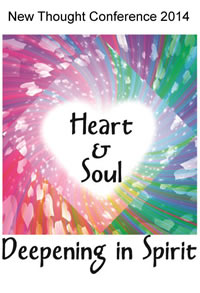7th Annual Canadian New Thought Conference explores themes of Heart, Mind and Soul within the context of the tradition of "New Thought Ancient Wisdom."
EDMONTON, Canada - (EINPresswire via NewMediaWire) - March 29, 2014 - The 7th Annual Canadian New Thought Conference under the leadership of Rev. Tim Peterson brings together a stellar cast of creative thinkers in the Heart of Canada at the end of May. Presentations and workshops will explore the themes of Heart, Mind and Soul through the lens of New Thought Today. Within the context of the tradition of "New Thought Ancient Wisdom", presenters will share their insights into how people can create more meaningful and joyful experiences through using techniques of meditation, visualization, the power of the spoken and written word as well as how ceremony can be an effective tool of empowerment.
(EINPresswire via NewMediaWire) - March 29, 2014 - The 7th Annual Canadian New Thought Conference under the leadership of Rev. Tim Peterson brings together a stellar cast of creative thinkers in the Heart of Canada at the end of May. Presentations and workshops will explore the themes of Heart, Mind and Soul through the lens of New Thought Today. Within the context of the tradition of "New Thought Ancient Wisdom", presenters will share their insights into how people can create more meaningful and joyful experiences through using techniques of meditation, visualization, the power of the spoken and written word as well as how ceremony can be an effective tool of empowerment.  The roots of New Thought can either be traced to Anne Hutchinson whose seminal teachings in 1638 and subsequent trial are considered to have influenced Thomas Jefferson’s concepts of the Freedom of Thought and Religion. (Anne's teachings are mirrored by contemporary New Thought denominations: Unity and UFBL); or to Transcendentalists: Emerson and Thoreau, whose work is often cited as the reason for the inclusion of eco-principles within Today's New Thought movement; or more traditionally Phineas Quimby who expanded upon his training in Mesmerism to demonstrate "distance healing" concepts that might best be explained by quantum physics.
The roots of New Thought can either be traced to Anne Hutchinson whose seminal teachings in 1638 and subsequent trial are considered to have influenced Thomas Jefferson’s concepts of the Freedom of Thought and Religion. (Anne's teachings are mirrored by contemporary New Thought denominations: Unity and UFBL); or to Transcendentalists: Emerson and Thoreau, whose work is often cited as the reason for the inclusion of eco-principles within Today's New Thought movement; or more traditionally Phineas Quimby who expanded upon his training in Mesmerism to demonstrate "distance healing" concepts that might best be explained by quantum physics. The most eminent Canadian contributor to early New Thought was McGill University graduate Richard Maurice Bucke. "A crucial figure in psychiatry in the late nineteenth century", Bucke experienced a mystical moment of DivineUnity or Cosmic Consciousness in 1872 which he described as a: "sudden appearance; subjective experience of light (inner light); moral elevation; intellectual illumination; sense of immortality; loss of fear of death; loss of a sense of sin."
Bucke summarized his concepts in "Cosmic Consciousness: A Study in the Evolution of the Human Mind" which influenced Carl Jung as well as Ernest Holmes and countless other scientists, mystics and psychologists.
Cosmic Consciousness presages today's consciousness studies and neuroscience research. Bucke's work parallels Henry Drummond's whose concept of the role of care and compassion in the evolutionary process was ultimately expressed mathematically in the "Equilibrium" for which John Nash was awarded a Nobel Prize in 1994. (http://spiritualawarenesscenter.org/beliefs/the-equilibrium.html#TopOfTopic)
Bucke's work reflected Philosopher John Bascom's writings: "Evolution and Religion", "New Theology" and of course Bascom's 1881 book "Science of Mind". The works of Bascom, Bucke, Drummond and Thomson Jay Hudson were combined with others when distilled into Ernest Holmes' 1927 version of "Science of Mind". Cosmic Consciousness is an acknowledged influence upon major creative thinkers throughout the 20th Century.
Many of these works can be read for free at: www.NewThoughtLibrary.com
Forms of New Thought include:
A. ~ "Mental Science" which describes a form of New Thought that focuses solely upon mind training to manifest personal evolution. Mental Science adherents are sometimes, if not often agnostic, or atheist.
B. ~ "Divine Science" is a term that describes the form of New Thought which proposes: “limitless Being, God [Good] is equally present everywhere”. Divine Science propounds that "evil" is a human created phenomenon and that as individuals awaken to the truth of their "atonement" [oneness with the Divine], they act in alignment with highest good for all beings. http://divinescience.com/
C. ~ "Science of Mind" is a generic term used by various early New Thought writers to describe a form of New Thought which combines the latest scientific breakthroughs with the finest in Ancient Wisdom traditions while propounding the belief in a responsive Universal Energy.
D. ~ Other forms of New Thought are rooted within and emphasize various Ancient Wisdom traditions such as Buddhism, Taoism, or more commonly Abrahamic traditions.
~ New Thought information: www.NewThought.info
All of New Thought rests on the principle that "as we change our thinking, we change our lives." Thus it follows that New Thought adherents cite article 18 of the Universal Declaration of Human Rights: "Everyone has the right to freedom of thought, conscience and religion; this right includes freedom to change his religion or belief" as an essential freedom. http://www.un.org/en/documents/udhr/
The 7th Annual Canadian New Thought Conference will give participants the opportunity to explore the latest evolution of these concepts and contribute to the ongoing dialogue of New Thought Today.
Rev. Tim Peterson
Center for Spiritual Living Edmonton-Metro
780-452-1711